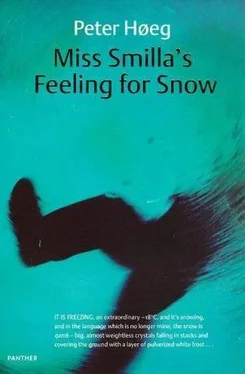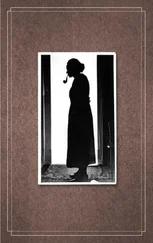Peter Høeg - Smilla's Sense of Snow aka Miss Smilla's Feeling for Snow
Здесь есть возможность читать онлайн «Peter Høeg - Smilla's Sense of Snow aka Miss Smilla's Feeling for Snow» весь текст электронной книги совершенно бесплатно (целиком полную версию без сокращений). В некоторых случаях можно слушать аудио, скачать через торрент в формате fb2 и присутствует краткое содержание. Жанр: Современная проза, на английском языке. Описание произведения, (предисловие) а так же отзывы посетителей доступны на портале библиотеки ЛибКат.
- Название:Smilla's Sense of Snow aka Miss Smilla's Feeling for Snow
- Автор:
- Жанр:
- Год:неизвестен
- ISBN:нет данных
- Рейтинг книги:3 / 5. Голосов: 1
-
Избранное:Добавить в избранное
- Отзывы:
-
Ваша оценка:
- 60
- 1
- 2
- 3
- 4
- 5
Smilla's Sense of Snow aka Miss Smilla's Feeling for Snow: краткое содержание, описание и аннотация
Предлагаем к чтению аннотацию, описание, краткое содержание или предисловие (зависит от того, что написал сам автор книги «Smilla's Sense of Snow aka Miss Smilla's Feeling for Snow»). Если вы не нашли необходимую информацию о книге — напишите в комментариях, мы постараемся отыскать её.
Smilla's Sense of Snow aka Miss Smilla's Feeling for Snow — читать онлайн бесплатно полную книгу (весь текст) целиком
Ниже представлен текст книги, разбитый по страницам. Система сохранения места последней прочитанной страницы, позволяет с удобством читать онлайн бесплатно книгу «Smilla's Sense of Snow aka Miss Smilla's Feeling for Snow», без необходимости каждый раз заново искать на чём Вы остановились. Поставьте закладку, и сможете в любой момент перейти на страницу, на которой закончили чтение.
Интервал:
Закладка:
At this point the structure of the ice crystals is based on the number six. Surrounding a hexagon, like a honeycomb of solidified water, six arms reach out toward six other cells, which in turn-as seen in a photograph taken with a color filter and greatly enlarged-dissolve into new hexagons.
Then frazil ice is formed, grease ice, and pancake ice, whose plates freeze together into floes. The ice separates out the salt, the seawater freezes from below. The ice breaks; surface packing; precipitation, and increased cold give it a rolling appearance. Eventually the ice is forced adrift.
In the distance is hiku, the permanent ice, the continent of frozen sea along which we are sailing.
Around the Kronos-in the fjord which the local current conditions have created (only partially understood and recorded)-different types of ice floes, hikuaq and puktaaq, are everywhere. The most dangerous are the blue and black floes, pure meltwater ice, which lie heavy and deep in the water; because of their transparency, they take on the color of the water surrounding them.
It's easier to see the white glacier ice and the gray sea ice, colored by air particulates.
The surface of the ice floes is a wasteland of ivuniq, packs of ice forced upward by the current and the collision of the plates; of maniilaq, ice knolls; and of apuhiniq, snow which the wind has compressed into hard barricades.
The same wind has blown agiuppiniq across the ice, snowdrifts that you follow with the sled when fog covers the ice.
As things now stand, the weather and the sea and the ice are allowing the Kronos to slip through. Lukas is sitting up in the crow's nest, coaxing his ship through the channels, looking for killaq, air holes, and letting the bow slide up onto the new ice, where it's less than twelve inches thick and the weight of the ship can crush it. He's making progress. Because the current is the way it is. Because the Kronos is built for it. Because he's an experienced captain. But we're just barely making headway.
Shackleton's ice-reinforced ship, the Endurance, was crushed by pack ice in the Weddell Sea. The Titanic sank. The Hans Hedtoft did, too. And so did the Proteus when it was attempting to rescue Lieutenant Greeley's expedition during the second International Polar Year. There are no statistics for the numbers of people lost on Arctic voyages.
It doesn't make any sense to try to conquer the ice, there's too much resistance in it. Right now I can see how the impact of collisions has splintered the edges of the floes, forcing them up into barriers sixty-five feet high, underneath, the floes extend a hundred feet down in the water. It's freezing up all around us. At this moment I can feel how the sea wants to close us in, how it's merely because of a coincidental, passing constellation of water, wind, and current that we're allowed to continue. A hundred sea miles north, the pack ice forms a wall that nothing can penetrate. Toward the east are the solidly frozen icebergs that have broken off from the Jakobshavn Glacier; in a single year it has calved a thousand icebergs, totaling over 140 million tons of ice, standing between us and the land like a rigid chain of mountains seventy-five sea miles from the coast. At any given time floating ice covers a fourth of the earth's ocean area. The drift ice belt in Antarctica is 8 million square miles; between Greenland and Canada it's between 3 and 4 million square kilometers.
Yet they still want to conquer the ice. They want to sail through it and build oil drilling platforms on it and tow table icebergs from the South Pole to the Sahara to irrigate the deserts.
These are schemes whose interim projections do not interest me. It's a waste of time calculating impossibilities. You can try to live with the ice. You can't fight it or change it or replace it.
In some ways ice is so transparent. It carries its history on its surface. Ice packs, knolls, and slush form when the ice melts and then freezes again. The blend of various ice ages in mosaic ice: the black fragments of sikussaq, ancient ice formed in protected fjords, released over time and forced out to sea. Now, in the last rays of the sun, a fine veil of qanik, snow flurries, falls from the clouds that the sun had evaded.
A reed stretches from the white surface straight into my heart. Like an extension of the saltwater tree within the ice.
When I wake up, I realize I've been asleep for some time. It must be night.
The Kronos continues to move forward. Its movements tell me that Lukas is still having to break through new ice.
I try the drawers in the medicine cupboard. They're locked. I wrap my sweater around my elbow and push in the glass. On the shelves there are scissors, clamps, and tweezers. An otoscope, a bottle of ethanol, iodine, sterile wrapped surgical needles. I find two disposable scalpels with plastic handles and a roll of Leuco bandages. I put the thin plastic handles together and wrap them with tape. Now they have some cutting strength.
There are no warning footsteps. The door simply opens. The mechanic enters carrying a tray. He looks more tired and more stooped than when I saw him last. His eyes fix on the broken glass.
I hold the scalpel against my thigh. My palms are sweaty. He looks down at my hand. I lay the knife on the bunk. He puts down the tray.
"Urs has out d-done himself."
I feel as if I'm going to throw up if I look at him. He goes over and shuts the door. I move away. Self-control is so fragile.
The worst thing is not the anger. The worst thing is the desire behind the anger. It's possible to live with pure emotion. What truly frightens me is my secret need to cling to him.
"You've been on expeditions yourself, Smilla. You know there c-comes a time when you have to let it proceed, when you can't stop it anymore."
Somehow I think that I don't know him, that I've never made love to him. On the other hand, there's a coldly dignified consistency in his lack of regret. As soon as the opportunity presents itself, I'm going to kick him out of my life. But right now he's the only frail, improbable chance l have.
"I want to show you something," I say. And then I tell him what it is.
He laughs tensely. "Impossible, Smilla."
I open the door for him, so that he'll leave. We've been whispering, but now I give up on talking softly.
"Isaiah," I say. "In some way you're part of it now. You're up on the roof with him, too."
His hands grip my arms and he lifts me back toward the examination table. "How c-can you be so sure, Smilla?"
His stuttering has gotten much worse. There's fear in his eyes. There may not be a single person on board the Kronos who isn't afraid.
"You won't run away, will you? You'll c-come back with me afterward?"
I almost laugh.
"Where would I go, Føjl?" He doesn't smile.
"Lander told me that he saw you walk on water."
I take off my socks. At the base of my toes there's a piece of bandage. It holds Jakkelsen's passkey in place.
We don't meet a soul. The light above the quarterdeck is off. When I let us in, we both realize that we're standing a few yards away from the deck platform where we waited less than twenty-four hours ago to observe Jakkelsen's last journey. This awareness means nothing in particular. Love arises when you have a surplus; it disappears when you're reduced to the basic instincts: hunger, sleep, the need for security.
On the lower level I turn on the light, a flood of light compared to the beam from my flashlight. Maybe I'm being rash, but there's no time for anything else. We'll reach our destination in a few hours at the most. Then the deck lights will be lit and these deserted rooms will be full of people.
We stop in front of the wall at the end of the room. I'm betting everything on my curiosity. I want to know why, according to my measurements, the wall has been moved more than five feet away from the hydraulic rudder system. Why there's some sort of generator behind the wall.
Читать дальшеИнтервал:
Закладка:
Похожие книги на «Smilla's Sense of Snow aka Miss Smilla's Feeling for Snow»
Представляем Вашему вниманию похожие книги на «Smilla's Sense of Snow aka Miss Smilla's Feeling for Snow» списком для выбора. Мы отобрали схожую по названию и смыслу литературу в надежде предоставить читателям больше вариантов отыскать новые, интересные, ещё непрочитанные произведения.
Обсуждение, отзывы о книге «Smilla's Sense of Snow aka Miss Smilla's Feeling for Snow» и просто собственные мнения читателей. Оставьте ваши комментарии, напишите, что Вы думаете о произведении, его смысле или главных героях. Укажите что конкретно понравилось, а что нет, и почему Вы так считаете.




![Рута Шепетис - Ashes in the Snow [aka Between Shades of Gray]](/books/414915/ruta-shepetis-ashes-in-the-snow-aka-between-shades-thumb.webp)







